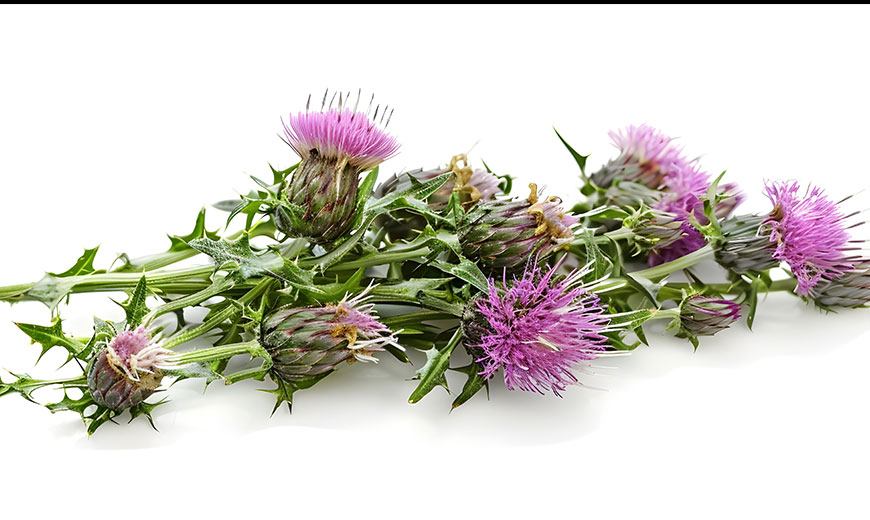Milk thistle (Silybum marianum) is a striking biennial herb native to the Americas, Australia, southern Europe, northern Africa and various parts of Asia. This herb has been used in folk medicine for over 2000 years. The extract of the medicinal plant has various health benefits . Besides being used for medicinal purposes, milk thistle can also be eaten as a vegetable in salads. Sea buckthorn seeds are also known to aid lactation in lactating women.
Active ingredients and their benefits
The main active substance in milk thistle is silymarin – a flavonolignan that is extracted from the seeds, leaves and fruits of the plant. Silymarin is known for its powerful antioxidant and anti-inflammatory properties, making it valuable for maintaining liver health. It can help protect the liver from damage, improve liver function, and promote liver cell regeneration. Because of its benefits, silymarin has been the subject of numerous scientific studies investigating its potential in the treatment of liver disease and other conditions.
With the growing interest of modern science, milk thistle continues to attract the attention of researchers and lovers of natural medicine, confirming its place in traditional and modern pharmacology.
What are the benefits of milk thistle for liver health?
Thanks to its antioxidant, anti-inflammatory and immunomodulatory properties, milk thistle plays an important role in maintaining liver health. Milk thistle extracts, containing the active ingredient silymarin, support liver health in several ways:
- Preventing Fat Oxidation: Silymarin helps preserve levels of glutathione, an important antioxidant that protects liver cells.
- Regulation of inflammation: It modulates inflammatory processes by reducing the production of inflammatory cytokines, for example tumor necrosis factor-alpha (TNF-α). This helps protect liver tissue from damage caused by toxins , alcohol and medication.
- Regeneration of liver cells: Silymarin stimulates protein synthesis, which supports the regeneration of liver cells.
Support for liver diseases
Multiple studies have shown that milk thistle may be beneficial for a variety of liver diseases, including non-alcoholic fatty liver disease, cirrhosis and hepatitis. Silymarin has shown promising results in the following areas:
- Maintenance of liver function: Helps normalize liver enzyme levels (ALT and AST) and bilirubin levels.
- Management of fibrogenesis: By modulating enzymes associated with cellular damage, silymarin may support liver health.
- Adjunctive therapy: Although it cannot be used as a primary treatment for hepatitis, silymarin has shown potential to improve the effectiveness of traditional therapies for hepatitis-related cirrhosis.
Additional health benefits
Anti-inflammatory effects
Milk thistle also offers benefits to other systems in the body:
- Gastrointestinal health: May reduce inflammation in ulcerative colitis by improving parameters such as erythrocyte sedimentation rate (ESR) and hemoglobin levels.
- Kidney health: In dialysis patients, it has shown an anti-inflammatory effect, confirmed by a decrease in TNF-α.
- Metabolic benefits: Helps regulate blood sugar, insulin and lipid profile in type 2 diabetes, indicating it may be useful in managing insulin resistance.
- Women’s Health: In patients with endometriosis, silymarin shows potential to reduce lesion size and disease-related pain.
- Neurological benefits: Silymarin has potential neuroprotective effects by regulating inflammatory mediators and reducing oxidative stress.
Antioxidant properties
Milk thistle helps fight oxidative stress in a number of ways:
- Free Radical Scavenger: Helps to neutralize harmful molecules in the body.
- Inhibition of the formation of reactive oxygen species (ROS): This reduces oxidative stress .
- Chelation of metals: Captures harmful metals in the gut before they cause damage in the body.
- Encouraging the production of protective molecules: Improves the action of antioxidant enzymes and restores important molecules such as NAD+.
Potential anticancer properties
Silymarin has demonstrated potential in anticancer therapy, including:
- Inhibiting oxidative stress and promoting apoptosis (cell death).
- Stopping cell progression: Silymarin can affect the cell cycle and inhibit mitochondrial processes associated with cancer cell growth.
- Improving the effect of chemotherapy: It can reduce the side effects of chemotherapy and increase its effectiveness in certain types of cancer.
In conclusion, milk thistle offers numerous health benefits, especially for the liver , and can be a valuable ally in the management of various health conditions.
How to use milk thistle?
Milk thistle is available in various forms:
- Capsules and tablets: Convenient to take and without any taste, they are preferred by many people.
- Tinctures: Liquid extracts that are absorbed quickly but may have an unpleasant taste.
- Teas: Made from powdered milk thistle seeds, they offer a milder effect.
It is important to know that the bioavailability of silymarin (the active substance in milk thistle) is often quite low. Phytosomal and liposomal formulations offer better absorption than conventional forms.
Dosing considerations
General dosage recommendations for silymarin are:
- Total liver support: 420-600 mg/day
- In case of alcoholism and hepatitis: 240-360 mg/day
- In cirrhosis: up to 1 g/day
- Drug-induced liver damage: 300-450 mg/day
- In acute hepatitis: 140 mg three times a day for 28 days
- For non-alcoholic fatty liver disease: 600 mg/day for 1 year
Dosages may vary depending on individual needs and health status, so it is recommended to consult a doctor.
Safety and side effects
Milk thistle is safe for most people to take when used properly, but possible side effects include:
- Stomach upset
- Diarrhea
- Headache
- Skin irritations.
Considerations and contraindications
Although there are no clear contraindications, pregnant and lactating women should consult a doctor before using milk thistle extract. Also, people with pre-existing health conditions or taking medications should seek medical advice before including milk thistle supplements in their regimen.
Resources:
- Ahmed, S., Ullah, N., Parveen, S., Javed, I., Jalil, NAC, Murtey, MD, Sheikh, IS, Khan, S., Ojha, SC, & Chen, K. (2022). Effect of Silymarin as an Adjunct Therapy in Combination with Sofosbuvir and Ribavirin in Hepatitis C Patients: A Miniature Clinical Trial. Oxidative Medicine and Cellular Longevity, 2022, e9199190. https://doi.org/10.1155/2022/9199190
- Ancuța Cristina Raclariu-Manolică, & Socaciu, C. (2023). Detecting and Profiling of Milk Thistle Metabolites in Food Supplements: A Safety-Oriented Approach by Advanced Analytics. Metabolites, 13(3), 440–440. https://doi.org/10.3390/metabo13030440
- Bertagna, B. (2023, November 27). A Deep Dive into Milk Thistle’s Potential Impact on Type 2 Diabetes (J. Christie, Ed.). Rupa Health.
- Bertagna, B. (2024, January 4). Understanding the Potential Benefits of Milk Thistle for Fatty Liver (J. Christie, Ed.). Rupa Health.
- Cloyd, J. (2022, August 17). An Integrative Medicine Approach to Rheumatology. Rupa Health.
- Cloyd, J. (2023a, February 15). Functional Medicine Treatment for Anemia of Chronic Disease. Rupa Health.


